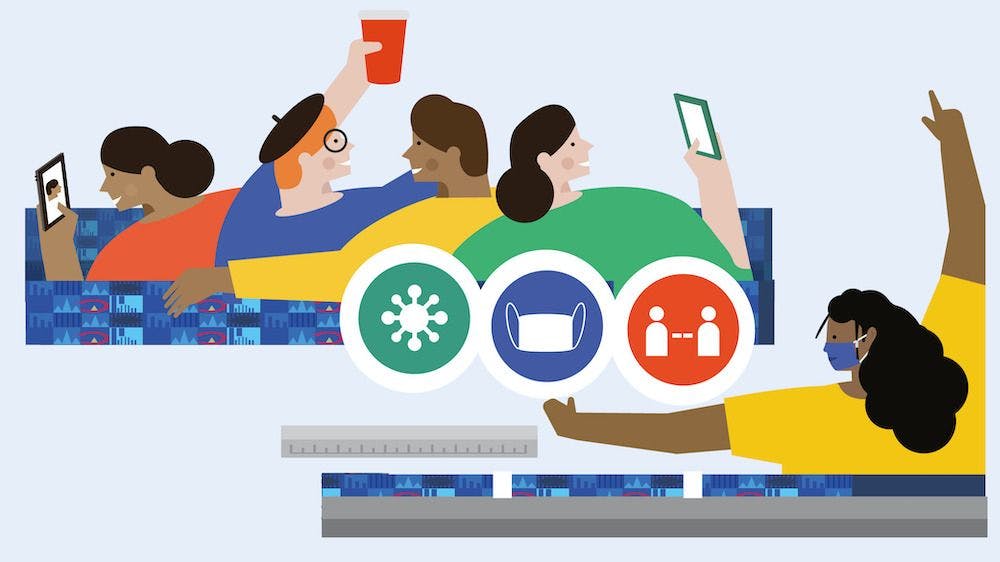How to manage illness anxiety in a post-lockdown world
updated on May 10, 2021

The gradual return to normal life once the pandemic is under control could bring its own set of mental health issues
Over the coming months, as the government aims to gradually ease lockdown restrictions across the UK, many of us will find our daily lives changing once again. Restaurants and pubs will be able to welcome patrons, hairdressers and beauty salons will correct the after-effects of our lockdown DIY dos and, at last, we might be able to meet and chat to our friends, parents, and grandparents.
While some may be eager to get back into the swing of normal life, for others the thought of venturing out into a post-lockdown world can bring about feelings of fear and anxiety.
A recent survey by Anxiety UK reported that 67% of respondents experienced an increase in anxiety over the prospect of lifting or easing lockdown restrictions. Contracting the virus, being in public spaces, going to social events, and getting back to pre-restriction routines, were among the biggest concerns for respondents.
It’s completely normal to feel more conscious about your health right now. With a threat as uncertain and continuous as the coronavirus pandemic, experiencing illness anxiety makes total sense. However, if this anxiety feels like it’s taking over your life, it can put a significant strain on your mental wellbeing.
While the future effects of lockdown restrictions easing remain uncertain, there are things you can do to help manage illness anxiety and take care of your mental health.
Focus on what you can control
Following public health guidelines, and adopting protective behaviours – such as wearing a face mask in shops and on public transport, and washing your hands regularly – are just a few ways to feel more confident and in command of your own, and others’, safety.
You may also find it helpful to write a list of your specific concerns, then ask yourself what you need to feel more comfortable in the scenarios you’re afraid of. You can’t control everything, but you can work towards finding practical solutions to your worries, and gradually implementing them within your daily routine.

Try to limit how often you check for symptoms
Although it’s still important to be mindful of new symptoms – NHS guidelines continue to advise people with any symptoms of coronavirus to self-isolate and get tested – constantly checking for signs of illness can increase feelings of anxiety.
NHS Foundation Trusts recommend making a plan to gradually reduce the number of checks you allow yourself each day. If you take your temperature often, set yourself a plan to reduce these checks by two each day, until you feel comfortable without this reassurance.
Share your concerns with others
Opening up about your concerns can help you establish boundaries as you begin to resume normal activities. When planning to go out, share your needs with the people and places you intend to visit, and request reasonable accommodations in order to make your visit more comfortable and enjoyable. Don’t be afraid to ask about what protective measures are in place, and how busy venues expect to be. It isn’t too demanding. It’s self-care.
"67% of respondents experienced an increase in anxiety over the prospect of lifting or easing lockdown"
Don’t gaslight yourself, or allow others to gaslight you
Seeing others return to normal activities may lead you to question the validity of your own fears.
But, managing your anxieties does not include dismissing them. Instead, work through them with understanding and self-compassion, and don’t be too hard on yourself if you feel overwhelmed from time to time.
Take things at your own pace
Just because restrictions are easing, it doesn’t mean you have to rush back into your pre-pandemic routine. Lockdown has given many of us an opportunity to slow down, and so getting back to our once busy lives won’t happen overnight.
Take as much time as you need and don’t put too much pressure on yourself. You will get there, one day at a time.
To connect with a counsellor to discuss illness anxiety, visit counselling-directory.org.uk

